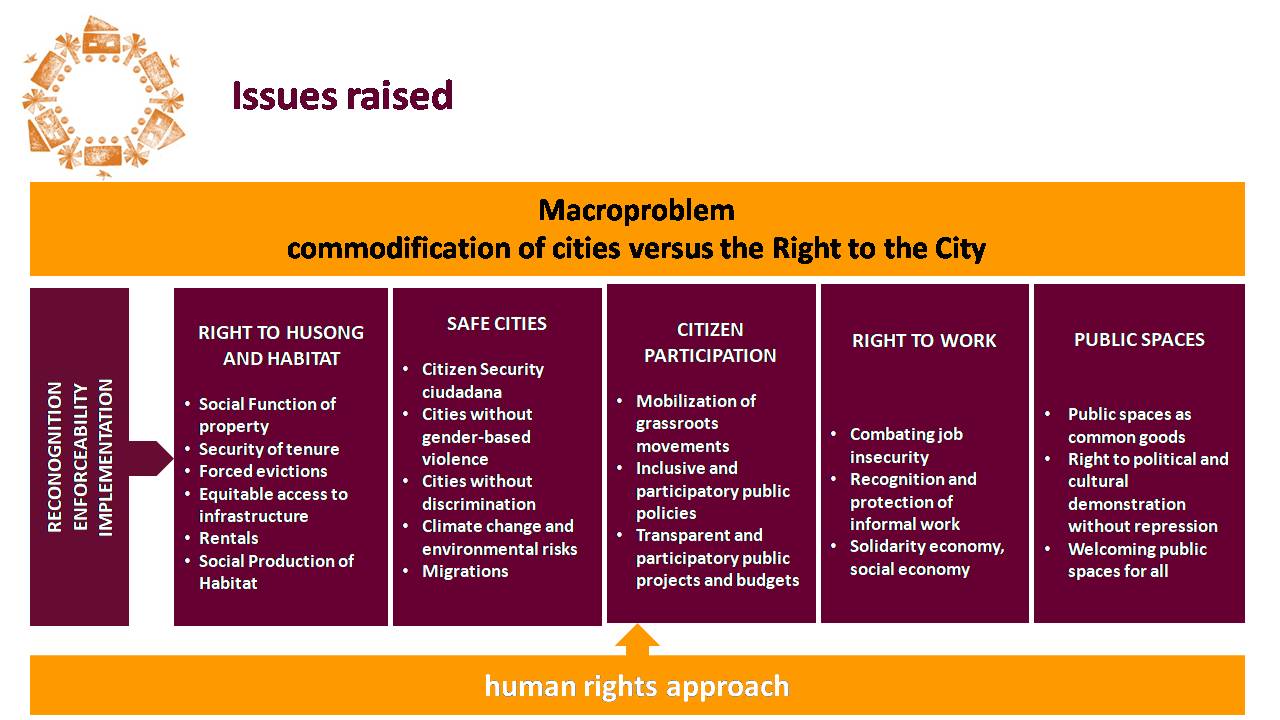The Latin American regional planning workshop of the Global Platform for the Right to the City (GPR2C) took place on 15 and 16 April in Lima, Peru. This workshop was attended by 24 organizations from 8 Latin American countries: Argentina, Bolivia, Brazil, Colombia, Ecuador, Mexico, Peru and Venezuela. All of theorganizations that were in attendance work on issues related to the Right to the City.
The main objective of this workshop was to activate the GPR2C Latin American Group. To this end, a presentation was given on the Right to the City and the Global Platform for the Right to the City, briefly explaining its vision, mission, organization, strategic plan and communication plan.
This presentation opened the debate on the concept of the Right to the City according to the regional context. Participants highlighted different themes: the understanding of the Right to the City as a collective or diffuse right, considering the political and historical importance for Latin America of the affirmation of collective rights, as opposed to individual rights; the idea of the city as a common good, a point that was eliminated in the final document of the New Urban Agenda (NUA); the importance of reaffirming democracy and participatory management as essential for the Right to the City; and the reflection on the contributions and limitations of the idea of the “BuenVivir” (Good Living)-a concept of the Quechua and Aymara indigenous peoples, which expresses the idea of a life that is not better than that of others, and that does not continue to strive to improve it, but is simply good – for the advancement of the Right to the City.
Subsequently, the participants raised common problems and demands. The overarching problem raised was the commodification of cities, which subjected people to the logic of capital, bringing about policies of privatization of public spaces and services; the defense of the right to commercial property to the detriment of the various forms of land occupation with a social function; the denial of the social production of habitat; and the increase in socio-spatial segregation. This logic variously manifests ininternational discourseas smartcities, city-markets, productive cities, and so forth.
Among the demands for the realization of the Right to the City were: the right to housing and habitat, security in cities, citizen participation, the right to work and democratic public spaces. These demands must be realized in the form of political and legal recognition, legal enforceability and implementation through urban planning and public policy. Such a vision must be interpreted under the human rights approach.
These problems and demands are listed in the following table:
Finally, the participants agreed on working strategies for the Latin American group of the GPR2C. These strategies are based on 4 themes on the Right to the City: its recognition, with proposals such as training and dissemination of pertinent materials ; its enforceability, with research and public policy debate actions; its implementation, following up on the commitments of the global agendas; and the communication of the GPR2C, with ideas such as opening channels of dialogue and networking, among others.
Following this workshop, the Latin American group of the GPR2C was officially activated, in which its members declared that they share the vision and mission of the Platform, committed themselves to giving the regional vision on the Right to the City and to working actively on regional strategies aligned with the strategic plan of the Global Platform for the Right to the City.
Click here to read the full report in Spanish.
For more information about the regional group contact the coordinators:
Henrique Frota: henriquebfrota@polis.org.br
Nelson Saule: nelsaule@uol.com.br






